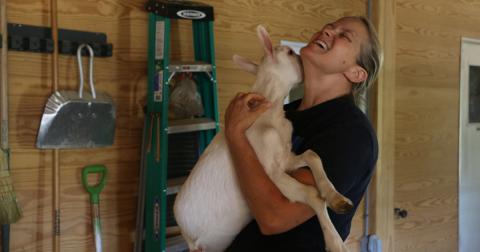Adding Goals to a Herd of Goats

“Goats are addictive.” That’s the way Andrea Rhodes describes how her family’s small farm in Lebanon, NH grew from a couple of goats and horses into the bustling goat dairy farm it is today.
In 2011, Andrea was a health care worker with little farming experience. Memories of her grandparents’ hobby farm stuck with her, though, and she dreamed of owning her own land. When a portion of land previously part of Manchester Farm became available that year, Andrea couldn’t resist the opportunity. Now, six years later, Andrea and her husband run Sunset Rock Farm in Lebanon with the help of their daughter, Rachel.
“It’s a way to be my own boss, and I’m working harder than I ever have,” she says.
In 2012, they got their first two goats, which were supposed to co-graze with the horses. However, once they realized how delicious goat milk was and how much they enjoyed making goat cheese, they never turned back. Two goats led to more and more. Now, the Rhodes have more than 30 adult female goats, along with ducks, chickens, horses, and Maremma sheepdogs.
As the farm grew, Andrea knew she needed more information to improving her business. That’s why she turned to Annie’s Project in 2016. Annie’s Project is a nationwide program that arrived in New Hampshire in 2014. Founded by Ruth Hambleton in memory of her mother Annette Fleck, Annie’s Project classes educate and empower women farmers and strengthen their roles in agriculture. Workshop topics include marketing, finances, communication and networking. The next retreat takes place at Bretton Woods on Oct. 27-29.
Having previously taken other Extension classes, Andrea knew she’d learn relevant, helpful information. But she was surprised at how the workshops made a difficult topic like finance easy to understand. By the time she left, she had a new set of goals for Sunset Rock Farm and a plan for achieving them.
“It made me think about what my end game was and how to succeed,” she says.
The workshops were a comfortable place to ask questions and get feedback from other participants, according to Andrea. Having other women farmers in class, sharing information and offering different perspectives was especially valuable.
Andrea adds that the class was a great way for the women to create a network. She even sold two goats to one of the participants — possibly the start of another success story.